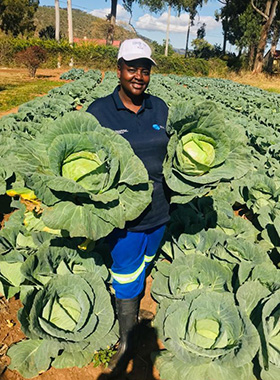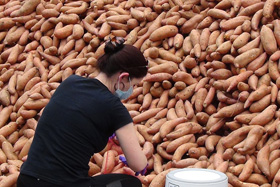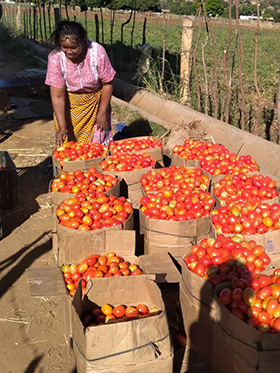With many pastoral activities suspended amid lockdowns to stop the spread of the coronavirus, some clergy families in Africa are falling back on farming to survive.
The economic impact of the pandemic has been severe, particularly in poor nations like Zimbabwe, where the unemployment rate is estimated at more than 90%. According to the World Food Program, more than half the population, 7.7 million people, are food insecure.
Many pastors are using their agricultural knowledge and skills to venture into backyard farming, including short-season crops, horticulture and small livestock production.
The Rev. Alan Masimba Gurupira, administrative assistant to Bishop Eben K. Nhiwatiwa, said that with COVID-19 restricting most people to their homes, those who are innovative are making good use of their time through farming.
“Making friends with the soil has helped pastors produce vegetables for family consumption and possibly sales,” he said.
He said the farming efforts of pastors have impressed the church members and revived an old United Methodist Church teaching in Zimbabwe “on self-reliance through the butcher shop and garden in the backyard.”
The Rev. Tafadzwa Musona, Mutasa Nyanga District superintendent, said she suspected COVID-19 was likely to keep people home and she turned to farming.
“I turned my efforts onto the land. Access to land is the biggest asset one could wish to have. Tracing back into my past humble life, I had a lot to rekindle. My past had been overshadowed when I joined the ministry. My farming skills were turned into fishing people to Christ.”

The Rev. Tafadzwa Musona, Mutasa Nyanga District superintendent, displays some of the 2,000 cabbages and other produce she sells to supermarkets in Mutare, Zimbabwe. Photo by Kudzai Chingwe, UM News.
“The outbreak of COVID-19, though it had a lot of negativity, has given us a lot of time to reflect and forced us to pick (up) the pieces and move on.”
Musona said she began farming in late March when the open markets closed.
She planted 2,000 cabbages, mustard rape (tsunga) and leaf vegetables (rape), and said the crops were so successful that the family had to hire someone to help in the garden three times a week.
Musona also has been using her good fortune to assist others.
“I donated my first fruits to Fairfield and Simukai children homes and the church. I also paid $2,000 as an allowance for the pastor at my home circuit and school fees for my children. I feel joy and am humbled by some of the charity work I am doing,” she said.
Her high quality produce also secured her a contract with one of the leading supermarkets in Mutare, which she said earns her close to $5,000 per week.
“As a leader, I am urging every member, even pastors and unit heads at (United Methodist Old Mutare) Mission, to utilize the small pieces of land that they have so as to earn a living.”
Addressing food insecurity

Volunteer Elyssa Bollinger packages gleaned sweet potatoes for distribution during a Society of St. Andrew “potato drop.” Photo by Michael Binger, Society of St. Andrew.
Food-related ministries, a mainstay of United Methodist mission work, have provided a way for the church to respond to food access problems created by the coronavirus pandemic and the continuing economic effects of the crisis.
The fourth-year United Theological College student and married mother of three, lives close to the border with Mozambique and has started farming beans and butternut squash.
“I bought 20 kilograms of bean seed for $23, planted (it) and I am expecting to harvest at least 440 kilograms and my expected income is $460,” she said, adding that she also expects to get a return of $2,000 on the 600 butternut squash seeds she planted.
“With this money, I will be able to support my family and meet all the study costs needed for my children, husband and I,” Mukwindidza said.
The Rev. Joseph Chimberengwa, pastor in charge of St. Mark United Methodist Church in Chipinge and Chimanimani Chipinge District connectional ministries director, said most communities in his district — a region with high rainfall — earn their living through farming.
“When I got this opportunity due to the indefinite lockdown, I decided to join them in agriculture production so that we can speak the same language as I evangelize to them. Luckily, I was given a one-hectare plot by one of the church members,” he said.
“I am into green mealies and vegetable production. I am doing well and I do not regret it. My life will never be the same and I have gained more respect from the community.”

The Rev. Vienna Mutezo, Zimbabwe West Conference connectional ministries director, prepares her tomatoes for the market. Since the lockdown, she has been growing tomatoes, beans and leafy vegetables in the backyard of her parsonage and on a plot about 150 miles from Harare. Photo by Kudzai Chingwe, UM News
“My objectives were to kill dead time during the lockdown and to supplement my income,” she said. “In shops, the prices of basic commodities are escalating daily, eroding my salary, but with this agriculture venture, I cannot complain. You harvest what you sow and you eat from your sweat; this is what I am doing,” she said.
The Rev. Ronnie Kuziva Nyakuengama, pastor in charge at Murehwa Mission Centre United Methodist Church and Murehwa, Uzumba Maramba Pfungwe District connectional ministries director, said the COVID-19 outbreak has given pastors time to nurture side projects.
“As a family, we came up with a plan to spearhead a project to boost the family coffers. We engaged in a small-scale horticultural project on a one-hectare plot within Murehwa Mission and another one-hectare plot at Old Mutare Kelly’s Park,” he said.
“So far, we have planted, 2,000 tomato plants, 2,000 cabbages (and) 30 beds … of rape now ready for sale,” he said, adding that a second cycle of tomato plants and cabbages will be planted in mid-July, along with sugar beans.
At Old Mutare Kelly’s Park, green maize is under production, and after harvesting the corn, castor beans will be planted, Nyakuengama said.
“From the proceeds, I have managed to sustain my family, paid school fees for my child who is at the university, contributed on the sprucing up of my retirement home and boosted my financial state since incomes from church salaries are low due to economic hardships facing our nation.
Subscribe to our
e-newsletter
Like what you're reading and want to see more? Sign up for our free daily and weekly digests of important news and events in the life of The United Methodist Church.
Pastors in the Congo are also urging United Methodists to grow food.
The Rev. Ezéchiel Mathe, Bukavu District superintendent in Congo, has urged United Methodists to have small gardens at home to supply food for their families.
Jolie Mwaidi, leader of the women’s organization in Kivu, said the pandemic has made securing food difficult.
“It is a hard period for us because you can have money but the markets are closed. My garden with amaranths, cassava leaves and cabbage has been sustaining me since March,” she said. “In times of excess produce, I share with other Methodist families from my block.”
Olive Paluku, Mathe’s wife, has done the same. She said she helped more than 10 families from Ibanda United Methodist Church with the eggplants and vegetables from her garden.
East Congo Bishop Gabriel Yemba Unda encouraged clergy and laypeople not to lose hope during these difficult times.
“May our Lord God put his comforting and protective hand over his people in distress, because we know that nothing is impossible for him. He has always stopped the wind, the rains and all other forms of disasters to be able to protect his people,” he said.
Chingwe is a communicator for the Zimbabwe East Conference. Congo communicator Philippe Kituka Lolonga contributed to this report.
News media contact: Vicki Brown, Nashville, Tennessee, (615) 742-5470 or newsdesk@umcom.org. To read more United Methodist news, subscribe to the free Daily or Weekly Digests.
Like what you're reading? Support the ministry of UM News! Your support ensures the latest denominational news, dynamic stories and informative articles will continue to connect our global community. Make a tax-deductible donation at ResourceUMC.org/GiveUMCom.




